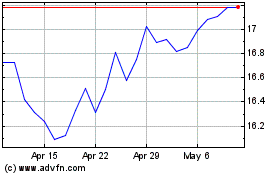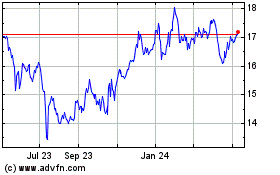AT&T Thwarted In Focus On Trump -- WSJ
February 21 2018 - 2:02AM
Dow Jones News
By Brent Kendall
This article is being republished as part of our daily
reproduction of WSJ.com articles that also appeared in the U.S.
print edition of The Wall Street Journal (February 21, 2018).
WASHINGTON -- A federal judge on Tuesday undercut AT&T
Inc.'s plans to argue that the Justice Department is challenging
its acquisition of Time Warner Inc. for political reasons, ruling
that the company can't have information on internal government
deliberations.
AT&T has argued that the government's case was influenced by
President Donald Trump's opposition to the deal and his disdain for
Time Warner's CNN, a network he has criticized repeatedly.
The Justice Department has denied the charges, accusing the
companies at a court hearing Friday of raising a Trump-bias
"sideshow" as a way to justify an anticompetitive merger.
The companies said they didn't relish raising the bias issue,
but said they had reason to question whether they had been treated
fairly. They argue their $85 billion deal won't hurt consumers and
shouldn't have been challenged by the Justice Department.
U.S. District Judge Richard Leon's seven-page ruling Tuesday
said there are high legal hurdles for defendants seeking access to
government communications to build a bias defense and the companies
"have fallen far short" of overcoming them.
The companies "have not made a credible showing that they have
been especially singled out" by the Justice Department's lawsuit,
Judge Leon wrote.
"We are pleased with and respect today's decision, which will
permit the parties and court to focus on the case at hand," Justice
Department spokeswoman Kerri Kupec said. "This case has always been
about protecting consumers from competitive harms, and we look
forward to presenting our case at trial on March 19."
Daniel Petrocelli, the lead trial counsel for AT&T and Time
Warner, didn't press the issue. "We respect the judge's decision
and look forward to the coming trial," he said in a statement.
In defense of the Time Warner deal, AT&T has argued
primarily that the transaction would benefit consumers and
advertisers and help it compete with disruptive companies like
Netflix, Google and Amazon.
From the day it was sued last November, AT&T has also openly
questioned the department's motives.
AT&T Chief Executive Randall Stephenson has called the
tensions between Mr. Trump and CNN the "elephant in the room," and
has noted that the department's antitrust chief, Makan Delrahim,
came to the position after serving as a deputy White House counsel
for Mr. Trump.
The telecom giant moved recently to put Mr. Delrahim on its
witness list for the approaching trial, a highly unusual move.
Under questioning from Judge Leon at Friday's court hearing, the
company agreed to take Mr. Delrahim off the list, but reserved the
right to seek to add him back later if it believed there was good
cause for doing so.
Mr. Delrahim was confirmed in late September as head of the
antitrust division and announced the decision to sue AT&T seven
weeks later. He and the department alleged the vertical combination
of AT&T's video distribution with Time Warner's popular cable
programming would give the combined company the power to raise
prices, slow innovation and hinder competitors.
Mr. Delrahim has said he wasn't influenced by the White House
and politics played no role in his decision.
At last week's hearing the Justice Department said it had been
willing to approve the merger if AT&T had agreed to change the
structure of the deal by selling off certain assets. It argued the
companies should be prohibited from making bias claims at trial,
saying the companies' request for internal documents was an
unjustified "fishing expedition."
The department has previously produced a log of certain
communications between the White House and Justice Department's
antitrust division, but said all those communications involved
preparations for Mr. Delrahim's Senate confirmation hearing.
AT&T wanted Judge Leon to require the Justice Department to
produce a log of additional communications, if any existed, about
the White House's input on the transaction.
The company sought information on potential communications
between the White House and the attorney general's office, as well
as internal Justice Department communications citing the
president's views.
In rejecting the request, Judge Leon's ruling Tuesday signaled a
broader skepticism of AT&T's contention that the Justice
Department's lawsuit was unprecedented in recent times.
"History belies the notion that this action is the first and
only time that the government has found an antitrust problem with a
proposed vertical merger or insisted on a structural remedy as a
condition to settlement," the judge wrote. "So while it may,
indeed, be a rare breed of horse, it is not exactly a unicorn!"
--Drew FitzGerald contributed to this article.
Write to Brent Kendall at brent.kendall@wsj.com
(END) Dow Jones Newswires
February 21, 2018 02:47 ET (07:47 GMT)
Copyright (c) 2018 Dow Jones & Company, Inc.
AT&T (NYSE:T)
Historical Stock Chart
From Mar 2024 to Apr 2024

AT&T (NYSE:T)
Historical Stock Chart
From Apr 2023 to Apr 2024
